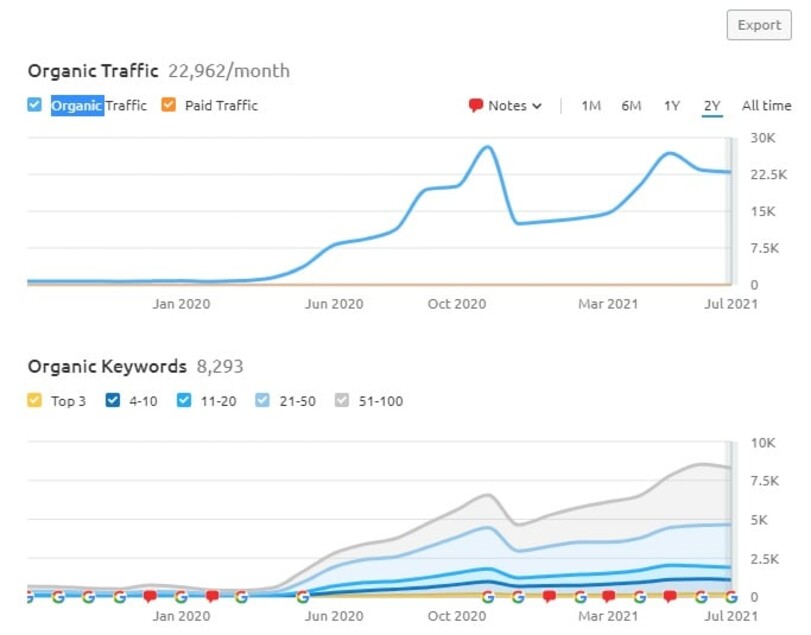When looking for an SEO expert in Sydney, it is essential to understand the qualifications needed to make sure that the expert can do the job properly. A qualified SEO expert should have a deep technical understanding of search engine algorithms and how they interact with websites. They should also be able to accurately identify the best keywords for website optimization and be able to track and monitor website performance to identify any improvements that can be made.
In addition, a qualified SEO expert should have a strong understanding of content marketing, website coding, and link-building techniques. They should also have the skills to develop engaging content for website visitors that is optimized for search engine rankings. Finally, they should be knowledgeable in the latest trends and industry news related to search engine optimization. This knowledge will help ensure that your website is optimized to maintain its ranking in the search engine results.
Knowledge of SEO Strategies and Tactics
To understand SEO strategies and tactics, one must have a deep understanding of search engine algorithms, effective keyword research and optimization, and experience with link-building strategies.
Search engine algorithms are the rules and regulations implemented by search engines in order to rank web pages in order to display the most relevant results for a given search query. It is important to understand these algorithms and how they work in order to create a successful SEO strategy.
Effective keyword research and optimization is essential to any SEO strategy. Researching keywords and understanding how to optimize these keywords for search engine visibility is a crucial part of successful SEO.
Understanding of Search Engine Algorithms
Having a solid understanding of the algorithms used by major search engines such as Google, Bing, and Yahoo is an essential element for any successful SEO strategy. To effectively execute SEO, it is important to have a comprehensive understanding of how search engines use algorithms to determine the ranking of a website.
Search engine algorithms are constantly changing and evolving, and they use a variety of algorithms and criteria to assess the quality of a website. The criteria used by search engines can include the relevance of content, the number of incoming links, the loading speed of a website, and the optimization of titles and descriptions.
It is also important to understand how to create content that will be accepted by search engine algorithms. Quality content should be relevant to the subject matter, should be free of spelling and grammar mistakes, and should be written in a way that is easy for search engine robots to understand. Additionally, content should be regularly updated to keep it up to date with the latest trends.
In order to maximize the effectiveness of SEO, it is important to have a well-rounded understanding of how the search engines work, and how to create and optimize content that will be accepted by search engine algorithms. This understanding is key to attracting visitors and achieving a high ranking in the search engine results pages.
Effective Keyword Research and Optimization
Moving beyond the understanding of search engine algorithms, it is also important to have a thorough knowledge of effective keyword research and optimization. Keyword research is the process of finding keywords related to a website’s content that people are likely to search for on search engines. It is a powerful tool that can help drive more relevant traffic to sites. Effective keyword research requires careful consideration of the words and phrases individuals use when searching for something on a search engine.
Once the relevant keywords have been identified, the optimization process begins. This involves creating content on a website that is focused on the identified keywords. This can include webpages, blog posts, and other types of content that are written to target the identified keywords. Additionally, proper optimization requires that the keywords are placed strategically within the content in order to gain the desired ranking.
In addition to content optimization, keyword research, and optimization also involve analyzing the competition. Analyzing the competition involves researching the words and phrases other websites are targeting, as well as any strategies they may be using. This process can help to identify new keywords and strategies that can be used to gain a competitive edge.
Overall, effective keyword research and optimization are essential components for achieving SEO success.
Experience with Link Building Strategies
In order to create a successful SEO strategy, it is important to have a comprehensive understanding of link-building strategies. Link building is a process of creating links from other websites to yours, which can help to improve your website’s visibility. Through link building, you can increase the number of visitors to your website, as well as increase the authority of your website.
Link building involves finding websites that are relevant to your domain and establishing relationships with those websites. This can be done by creating quality content that other websites may be interested in linking to. It can also be done by directly reaching out to websites and asking for a link.
When it comes to link building, it is important to be strategic. It is important to focus on building links from websites that are relevant to your domain, as this will be more beneficial to your website’s visibility. Additionally, it is important to focus on building links from authoritative websites, as these links will be more valuable than links from less authoritative websites.
Moreover, it is important to ensure that your links are coming from natural sources. This means that you should avoid link-building tactics such as buying links or creating link networks. These tactics are not only ineffectual, but they can also get your website penalized by search engines.
Understanding of the Local SEO Market
Having an understanding of the local SEO market means having an extensive knowledge of local market trends, audiences, and SEO tactics. Additionally, knowledge of link-building techniques and local content marketing is essential for success in the local SEO market. It is important to understand what local audiences are looking for in terms of content and how to target them with engaging content. Link building is also a key factor, as it helps ensure visibility in local searches. Understanding the techniques for local content marketing helps ensure that content is created that is tailored to local audiences. Having a mastery of these components ensures success in the local SEO market.
Knowledge of Local Market Trends
Building a successful local SEO campaign requires an in-depth knowledge of the local market trends. It’s essential to stay up to date with the ever-changing landscape of the local markets. Companies must be aware of the most popular consumer trends, as well as any changes that could affect their target audience. Staying informed about the latest local market trends can help businesses craft marketing and SEO strategies that will be most successful in their specific geographic area.
It’s important to understand the demographics of a particular area and identify the behaviors and interests of the local audience. This understanding can help businesses create content and messaging that will resonate with their target market. Additionally, companies should strive to build relationships with local influencers and stay in tune with the conversations taking place in their community. All of this information can be used to inform the overall local SEO strategy.
Having a complete picture of the local market trends can help businesses identify the most effective SEO tactics for their target audience. Companies should focus on optimizing their website for local search engine results and make sure to include targeted keywords that are specific to their geographic area. Additionally, businesses should be aware of the different digital marketing channels that are popular in their local area. Understanding how the local audience consumes content can help companies craft effective digital marketing strategies.
Understanding of Local Audiences
With an eye for detail, a deep understanding of local audiences is essential for an effective local SEO strategy. This involves researching the target audience and their consumer behavior, as well as their needs, interests, and preferences. Knowing the demographic characteristics of a local market is key, as well as understanding the local culture and the way that people interact with each other.
Local SEO experts must also be aware of the trends that are relevant to the local area. This includes the types of products and services that are popular, the types of businesses that do well in the area, and the types of content that resonates with the local audience. This knowledge can inform the strategies for optimizing a local website and the types of content that should be created.
The understanding of local audiences must also be applied to the tactics used to reach them. This includes the use of localized keywords and content that speaks directly to the local market. It also involves using local directories, citations, and reviews to get the word out about the business. Additionally, local SEO experts must be aware of the local social media platforms that can be used to reach the target audience.
Finally, understanding the local audience is essential for creating effective link-building campaigns.
Experience with Local SEO Tactics
Taking the knowledge of SEO strategies and tactics to the local level, experience with local SEO tactics is invaluable when it comes to targeting local consumers. As the local market can vary greatly from city to city, the tactics for success must be tailored to reach the right audience. Knowing the nuances of each area is particularly important in the ever-changing digital landscape.
From leveraging local directories to creating a local search presence, local SEO tactics must be finely tuned to maximize visibility. To start, local search engine optimization experts must take the time to research the market, determine the most relevant keywords for the area, and include them in the content. Additionally, creating content that is specific to the local market, such as blog posts about local events or businesses, is key to building an engaged local customer base.
Social media is also an important element of local SEO, as it allows for two-way communication with customers. Moreover, local SEO experts can use social media to gain insights into the local market’s interests and behaviors. For instance, a local business can use social media analytics to understand the topics that are resonating with their customers.
Finally, link-building is an essential tactic for local SEO success.
Expertise in Technical SEO
Technical SEO requires expertise in understanding structured data, as it helps search engine bots accurately index web pages. Experience with website performance optimization translates to faster loading times and enhanced user experience, ultimately leading to better rankings. Proficiency with HTML, CSS, and JavaScript helps ensure site structure is optimized for crawling. Meta tags and content optimization ensures relevant keywords are targeted, while link-building helps drive more organic traffic. All of these elements come together to create an effective Technical SEO strategy.
Understanding of Structured Data
Having a strong understanding of the local SEO market is a great start, however, technical SEO expertise is also key for any SEO professional. One such expertise is understanding Structured Data. Structured data is a type of code that makes it easier for search engines to understand the content on a webpage. It also helps search engines display relevant information in the form of Rich Snippets within SERPs, which can help increase organic CTR.
Structured data can come in the form of Schema.org Markup, which is a type of language used to define the elements on a webpage. When implemented correctly, Schema.org Markup can help search engines index content on a page more accurately. It can also be used to add additional information to the SERPs such as price, ratings, and reviews, which can be useful for increasing organic CTR.
In addition to Schema.org Markup, Structured Data can also be implemented using JSON-LD. This type of code is typically used to add additional information to the SERPs such as breadcrumbs, product details, and company information. It can also be used to define the page type, which can help search engines index a page more accurately.
Experience with Website Performance Optimization
Expertise in Technical SEO is essential for any Local SEO market. A key component of this expertise is a deep understanding of website performance optimization. This means being able to improve website speed, as well as assuring the website is loading effectively on all devices.
This requires the ability to identify and troubleshoot any underlying issues that may be causing a website to slow or crash. It also means a comprehensive understanding of browser caching, content delivery networks, and server configurations. The ability to identify and resolve any issues with website performance is a crucial step in improving the overall SEO of a website.
When it comes to website performance optimization, the use of specialized tools can be invaluable. These tools can be used to track website loading times, identify potential problems, and fine-tune the code and content of the website. They can also help to ensure the website is loading quickly and correctly on all devices and browsers.
In addition, website performance optimization requires a keen focus on page speed. This means keeping an eye on-page elements that could be causing delays, as well as the optimization of images, scripts, and other elements of the website. It also includes the optimization of the server response time and the use of caching techniques.
Proficiency with HTML, CSS, and JavaScript
Building a successful website requires an understanding of HTML, CSS, and JavaScript. A technical SEO expert must have a thorough knowledge of these technologies in order to develop sites that are optimized for search engine rankings. From creating websites that have a user-friendly interface to those that are optimized for faster loading times, a technical SEO expert must have a comprehensive understanding of HTML, CSS, and JavaScript.
HTML, CSS, and JavaScript are the building blocks of modern web development. HTML allows developers to create the page structure, CSS allows them to control the look and feel, and JavaScript allows them to add interactive features and functionality. A technical SEO expert must understand how these technologies interact and how they can be used to create the best user experience and the highest-ranking website possible.
The technical SEO expert must also understand how various tags and metadata affect the way a website is indexed and ranked by search engines. HTML tags such as headings, paragraphs, and lists are all important for search engine optimization. Meta tags are also used to provide additional information to search engine bots and must be properly formatted and optimized for the best results.
In order to effectively optimize a website, a technical SEO expert must also understand how to use JavaScript to improve the loading speed and user experience.
Experience with Content Marketing
Content marketing is an important tool for businesses to increase their reach and attract more customers. An experienced content marketer should have a wide range of capabilities, such as the ability to create engaging content, a thorough understanding of SEO copywriting techniques, experience with content optimization strategies, link building, and social media promotion. Through the use of creative storytelling, persuasive copy, and SEO tactics, content marketers can draw readers in and influence them to take action. Content optimization strategies and link building are important for improving search engine rankings, while social media promotion can increase brand recognition and engagement.
Ability to Create Engaging Content
Building engaging content is an essential part of any effective SEO strategy. From crafting compelling blog posts to creating informative web pages, the ability to develop content that resonates with readers is invaluable. Having the right tools and techniques to craft engaging content that captures the attention of readers is essential, and it requires a deep understanding of copywriting at the same time.
As a content marketer, I have developed an appreciation for the subtleties of crafting compelling content. My experience has allowed me to create content that captures the attention of readers and encourages them to take action. I use various copywriting techniques such as storytelling, using the right language, and formatting the content for maximum impact.
I also understand the importance of optimizing content for SEO purposes. This involves researching keywords and using them strategically, optimizing titles and meta descriptions, and using headings to break up the content. I also pay close attention to the formatting to ensure that the content is readable and flows well.
Moreover, I am knowledgeable in link-building and social media promotion. I am capable of finding opportunities for link-building and leveraging social media platforms to broaden the reach of content. I also understand the importance of engaging with the audience and nurturing relationships with influencers.
Understanding of SEO Copywriting Techniques
In addition to the technical SEO skillset, having a background in content marketing is also integral for successful SEO strategies. Specifically, understanding SEO copywriting techniques is essential for creating content that is both search-engine friendly and appealing to visitors.
When creating content, SEO copywriters must consider both the needs of the search engine algorithms and the target audience. To achieve this balance, SEO copywriters must be familiar with the latest SEO trends, such as keyword research, title tag optimization, and meta descriptions.
Moreover, SEO copywriters must be able to craft engaging and compelling content that appeals to readers in order to build brand loyalty and encourage visitors to convert into customers. They must have an eye for detail and be able to create content that is both easy to read and informative.
In addition, SEO copywriters must be familiar with content optimization strategies, such as internal linking, semantic keyword optimization, and alt-tag optimization for images. These techniques help ensure that content is found easily by search engine spiders and that it is presented in the best possible way.
Finally, SEO copywriters must be able to create content that can be used in link-building and social media promotion campaigns.
Experience with Content Optimization Strategies
My expertise in technical SEO was just the beginning. I also have extensive experience with content optimization strategies that have helped countless businesses increase their visibility and reach.
From blog post optimization to optimizing product descriptions, I’ve been able to help many companies refine their content and help it rank higher in search engine results. My experience in this area allows me to optimize existing content and ensure that it is more relevant to the company’s target audience. I use an array of tools to analyze user intent and create content that meets those needs.
Additionally, I’m knowledgeable in SEO copywriting techniques, which allow me to craft content that is both engaging and optimized for search engine algorithms. As part of content optimization, I understand how to include keywords and phrases in strategic places. I also have experience with link building and social media promotion, which can help content reach a wider audience and increase search engine rankings.
No matter the content, I strive to make it engaging and valuable for readers. I know how to create content that is interesting, informative, and optimized for search engine algorithms. I use a combination of content optimization strategies, SEO copywriting techniques, link building, and social media promotion to help companies increase visibility and reach in the online space.
Understanding of Social Media Platforms
A comprehensive understanding of social media platforms requires knowledge of social media optimization strategies, experience with paid social advertising, and the ability to monitor social media analytics. YouTube, Quora, and other platforms provide unique opportunities for businesses to reach their target audience. By optimizing content, businesses can increase their visibility and engagement with their potential customers. Paid social media advertising campaigns can help businesses to reach larger audiences and increase their ROI. Finally, monitoring social media analytics provides valuable insight into what content is resonating with customers, what strategies are working, and what needs to be improved. With the right understanding of social media platforms, businesses can greatly improve their marketing efforts.
Knowledge of Social Media Optimization Strategies
Having mastered the nuances of content marketing, I have become a pro in devising effective social media optimization strategies. Optimizing content for social media is an art, and I have the tools and expertise to create content that resonates with the audience.
My analytical brain helps me develop strategies that allow me to maximize my ROI from social media campaigns. My knowledge and understanding of various social media platforms help me to create content that is tailored to the interests of the targeted audience.
I understand the importance of content optimization for each platform, and I am adept at creating content that is effective and engaging. For instance, I know that visuals and videos are more accepted and shared on Instagram, while Twitter is more suited to brief and witty content. I also understand that Facebook is perfect for creating content that engages the audience in conversations.
I am adept at using the latest social media tools and techniques to create campaigns that are successful and generate the desired results. My experience in creating social media campaigns has allowed me to gain a deep understanding of how to optimize content for social media and get the most out of it. I understand the importance of hashtags, optimized images, and other strategies that help me craft an effective social media campaign.
Experience with Paid Social Advertising
Continuing the discussion on the power of social media, I have considerable experience with paid social advertising. I have worked with a range of social channels such as Twitter, LinkedIn, and Instagram, to name a few, and I have used various strategies to target the right audiences and optimize campaigns. I have a good understanding of setting up the right campaign budget and creating effective ad content.
I have extensive experience in setting up and running campaigns that span multiple platforms. I have successfully identified the right channels to target the right audience and have managed campaigns with daily budgets of up to $1000. I also understand the need to stay up to date with the latest trends and changes in the social media landscape, and I have adjusted my campaigns accordingly.
My experience includes creating and optimizing campaigns for different objectives, including lead generation, website visits, and brand awareness. I have also used A/B testing to compare different ad formats and adjust the campaigns accordingly. Additionally, I have used detailed analytics to measure the success of campaigns and understand user behavior.
My experience with paid social advertising has enabled me to stay ahead of the curve and create campaigns that have generated considerable ROI for my clients. I understand the nuances of the different platforms and use this knowledge to create winning campaigns.
Ability to Monitor Social Media Analytics
Having a thorough understanding of social media platforms is essential for any content marketer, but it’s only half of the equation. Being able to monitor and analyze these platforms is just as important for creating successful campaigns. Therefore, it’s beneficial to have knowledge of social media analytics tools as well.
Social media analytics can provide invaluable insights into how content is performing on different platforms. It can also help marketers identify trends in customer opinion and engagement. With the help of analytics tools, content marketers can measure the success of campaigns in real time, adjust strategies as needed, and compare performance across different channels.
Analytics tools can also help marketers understand what type of content is resonating with their target audiences. By analyzing the performance of different content pieces, marketers can identify which topics and formats are more successful and adjust their content strategies accordingly.
In addition to helping marketers measure the success of their campaigns, analytics tools can also be used to track competitors. By keeping an eye on their competitors’ activities, marketers can gain insights into topics that are resonating with their target audience and develop content strategies based on that information.
Finally, analytics tools can be used to better understand the demographics of a brand’s target audience.
Expertise in Analytics
Analytics expertise is essential for digital marketing success. To achieve this expertise, an understanding of SEO analytics tools and experience with Google Analytics is essential. With these tools, one can monitor and interpret SEO metrics accurately. Competitor analysis further helps to assess performance, while Conversion Rate Optimization can be used to improve the effectiveness of campaigns. All these aspects are necessary for a successful analytics strategy.
Understanding of SEO Analytics Tools
Having a thorough understanding of social media platforms is an extremely valuable asset, but it’s only half the battle. When it comes to improving search engine visibility and ranking, having a deep understanding of SEO analytics tools is essential. Knowing how to use these tools to their fullest potential is the key to crafting a successful SEO strategy.
SEO analytics tools help companies monitor and analyze data related to their website’s performance in search engine results. By understanding the different metrics and indicators available, businesses can make informed decisions to optimize their website and content for better search engine visibility and ranking.
The ability to use SEO analytics tools requires a comprehensive understanding of how they work. This means understanding how to interpret different metrics, such as organic search traffic, page views, click-through rates, average time on page, and bounce rates. It also requires the ability to track keyword rankings, analyze competitor websites, and monitor how changes in content strategy affect website performance.
With the right understanding of SEO analytics tools, companies can make better decisions about their website content and design, and gain important insights into customer behaviors and trends. They can also use the data to identify opportunities to increase website traffic, improve search engine rankings, and optimize their conversion rate. All of these elements are essential for successful SEO campaigns.
Experience with Google Analytics
Having acquired a thorough understanding of social media platforms, the next step is to gain expertise in analytics. In particular, having experience with Google Analytics is essential for any digital marketer.
Google Analytics is a powerful tool, that allows for the tracking and analysis of website traffic. It can be used to monitor website performance, understand user behavior, track conversions, and much more. With it, a marketer can identify key areas for improvement, such as what pages are most popular, what content resonates best with users, and what marketing campaigns are yielding the best results.
Additionally, Google Analytics enables users to monitor and interpret SEO metrics, such as organic traffic and keyword rankings. This helps marketers understand the effectiveness of their SEO efforts and make any necessary adjustments. Through Google Analytics, it is also possible to get a comprehensive picture of a website’s competitors, allowing marketers to get a better sense of how their own website performs in comparison.
Finally, Google Analytics can also be used for conversion rate optimization. By monitoring the performance of different web pages, marketers can identify how to improve the website’s design and content to better convert visitors into customers. This can be done through A/B testing, where page variations are tested to see which one performs best.
Ability to Monitor and Interpret SEO Metrics
Taking the conversation further, my expertise in analytics goes beyond the understanding of social media platforms. I have a deep knowledge of SEO analytics tools and the ability to monitor and interpret SEO metrics. My experience with Google Analytics allows me to investigate the performance of websites and track important metrics such as click-through rates, page views, and website traffic. I am well-versed in SEO techniques and the algorithms used to rank websites, providing me with a competitive edge when it comes to analyzing and interpreting SEO metrics.
I am proficient in interpreting data to gain insights into user behaviour and the overall performance of websites. I am also adept at competitor analysis, which requires the use of various SEO tools and techniques. Additionally, I have a strong understanding of conversion rate optimization, allowing me to identify areas of improvement and boost website performance. I am adept at using various tools and techniques that allow me to track the website’s performance, from organic search rankings to the number of visitors.
I am confident in my ability to monitor and interpret SEO metrics on behalf of my clients and use the data to make informed decisions. My experience and knowledge of SEO analytics tools provide me with the skills to make changes in order to improve website performance.
Knowledge of Online Reputation Management
Having a comprehensive understanding of Online Reputation Management is essential to success, requiring expertise in reputation management strategies, monitoring, response, building, and influencer management. Strategic reputation management is the foundation, understanding the big picture, and the importance of the long-term impact of a company’s online presence. Experience in monitoring reputation is essential to understanding how customers perceive a business and identify potential threats. The ability to respond to negative reviews is key to maintaining a positive online presence. Reputation building involves creating positive content and promoting positive reviews. Lastly, influencer management allows a company to leverage the reach and trust of authorities and celebrities to build its reputation.
Understanding of Reputation Management Strategies
With a deep understanding of the importance of online reputation management, I have the strategies and resources to help protect and build a brand’s reputation. From developing a comprehensive plan to monitoring and responding to reviews, I have a deep understanding of the best practices for reputation management.
I have a keen eye for recognizing the potential for damage that can be caused by a negative review, as well as a clear understanding of how to craft a response that is both respectful and effective. With an understanding of the nuances of customer service, I have the ability to quickly and professionally respond to customer complaints. Additionally, I have the experience to develop strategies that can help to minimize the potential damage of a negative review.
I have the knowledge to create and execute a comprehensive reputation management plan that includes strategies for building a positive reputation, as well as strategies for responding to negative reviews. I have the expertise to develop and implement campaigns that will help to create a positive presence online. This includes monitoring brand mentions, engaging with customers on social media, and leveraging influencers to build a brand’s reputation and reach.
By leveraging my understanding of reputation management strategies, I am able to create and implement plans that will help protect and build a brand’s reputation.
Experience with Monitoring Reputation
Having a comprehensive understanding of reputation management strategies is essential to successful online reputation management, but having the experience to monitor a business’s reputation is just as important. Being able to stay on top of what’s being said about a business online is vital to protecting its reputation and preventing the spread of false information.
The ability to monitor online reviews and customer conversations in real time is a valuable skill for reputation management. It gives professionals the opportunity to identify any issues or potential brand risks before they become a problem. Monitoring can be done through a variety of methods, including using automated tools to track key performance metrics such as customer sentiment and feedback. Additionally, regularly searching for mentions of the brand online, using the appropriate keywords and hashtags, can identify potential opportunities or problems quickly.
In addition to monitoring, professionals need to be able to recognize important trends in the data and how they affect the reputation of a business. They must be able to make sense of the data to determine which elements are having the most impact and how to use that information to take action. Analyzing the results of monitoring activities to identify the root cause of any issues and taking the appropriate corrective action is also important.
Experience with monitoring a business’s reputation is a crucial part of any successful online reputation management program.
Ability to Respond to Negative Reviews
It is one thing to understand the strategies associated with online reputation management, but it is another to have the skill of responding to negative reviews with tact and poise. Handling negative feedback and reviews with a positive attitude is a key part of reputation management that requires deftness and finesse. Experienced professionals must demonstrate an ability to remain composed, while still expressing empathy and understanding.
At the same time, they must still maintain an authoritative presence and ensure that their responses are always professional and respectful. This includes understanding the subtle nuances of different digital platforms and how to respond accordingly. For example, a response to a review on Facebook might be different than a response to a comment on Twitter. Knowing the difference between these two platforms is essential for a successful online reputation.
In addition, reputation management experts must be able to take the necessary steps to contain any potential damage to one’s reputation. This includes finding ways to minimize the visibility of negative reviews, responding to reviews in a timely manner, and identifying any patterns of negative feedback. Furthermore, reputation management professionals must understand the power of words and how to effectively communicate with customers in order to build relationships and foster loyalty.
Lastly, experienced professionals know that responding to negative reviews is only part of reputation management.
Understanding of Conversion Rate Optimization
Having an understanding of Conversion Rate Optimization (CRO) is fundamental to the success of any digital marketing strategy. An effective CRO specialist must possess a comprehensive knowledge of User Experience Design, and be experienced with A/B testing to identify and measure what elements are driving user engagement. Additionally, they must possess the ability to analyze and optimize conversion funnels, establish target audiences, and develop effective CTAs. All these competencies come together to create a CRO specialist who can provide actionable insights that will help drive conversions and ultimately, increase ROI.
Knowledge of User Experience Design
Having established the importance of online reputation management, it is equally important to understand the impact of user experience design. User experience design is a critical element of conversion rate optimization, as it directly affects customer engagement and ultimately, sales.
Fostering a positive user experience requires the careful consideration of design elements that are conducive to the customer journey. Understanding how customers interact with a website or application is paramount in ensuring a seamless experience. The designer must be aware of how customers move through the site, how they interact with elements, and how long they spend on each page.
Additionally, user experience design must also be tailored to the target audience. Understanding the needs and wants of the customer base is essential in designing a website that meets their expectations. The designer must be able to create a product that is attractive and intuitive. Creating a website that is aesthetically pleasing and easy to use will help to reduce customer frustration and increase engagement.
Further, user experience designers must also account for the customer journey. To maximize customer engagement, it is important to identify key points in the customer journey and optimize them. This includes creating effective calls-to-action (CTAs) that are tailored to the customer’s needs.
Experience with A/B Testing
Having explored the importance of managing one’s online reputation, it is essential to understand the importance of Conversion Rate Optimization. Conversion Rate Optimization is a process of increasing the rate at which visitors to a website complete a desired action. A/B testing is an integral part of this process, as it allows for the comparison of two or more versions of a web page, in order to determine which layout, design, or content performs best in driving conversions.
A/B testing involves the creation of two or more versions of a web page, each containing slight changes in design, layout, or content. The pages are then compared to determine which version performs best in driving conversions. It is important to ensure that each version is tested for a statistically significant amount of time, in order to ensure that the results are reliable and accurate. This testing should be conducted on all elements of the page, including page layout, headline, images, content, and call-to-action (CTA).
When conducting an A/B test, it is essential to establish clear goals and objectives. This will help to ensure that the test is conducted in a systematic and organized manner and that the results are accurately interpreted and analyzed.
Ability to Analyze and Optimize Conversion Funnels
Moving on from online reputation management, it is imperative to understand the importance of conversion rate optimization, which makes it possible to understand the effectiveness of website elements. To this end, the ability to analyze and optimize conversion funnels is key. By using data mining techniques, it is possible to identify the areas of a website that are yielding the lowest conversion rate and target them for improvement. By doing so, businesses can ensure that their website is delivering the maximum number of conversions.
Analyzing conversion funnels requires a deep understanding of user experience design. This makes it possible to identify the areas of a website where users may be facing difficulties or confusion. The analysis also includes the use of A/B testing to determine which variants of a page are most effective in increasing conversion rates. Once the results of the analyses are in, businesses can then make adjustments to their websites to ensure that they are optimally converting users.
By understanding the user journey, it is possible to establish target audiences and create effective calls to action (CTAs). This makes it possible to provide users with the information they need to make an informed decision and take the desired action. Additionally, understanding user experience design makes it possible to create content that is tailored to the target audience, thereby increasing the chances of conversion.
Proficiency in Web Design
Proficiency in web design requires a deep understanding of the principles of responsive design and the ability to structure website content in an effective way. It also requires the ability to design intuitive web pages that are visually appealing and provide an optimal user experience. Expertise in image and video editing is essential to create engaging multimedia content and optimize websites for different devices and browsers. Comprehensive knowledge of cross-browser compatibility is crucial for ensuring that the website functions properly in a variety of web browsers. Only with a comprehensive mastery of these skills can one be considered proficient in web design.
Knowledge of Responsive Design Principles
Building on the understanding of conversion rate optimization, proficiency in web design is essential for achieving success. A key factor in web design is knowledge of responsive design principles. Responsive design is the practice of optimizing web pages for different device sizes and orientations. By leveraging responsive design techniques, developers are able to ensure that website visitors have an optimal experience regardless of the device that they are using.
The first step to creating a responsive design is to identify the various devices that are likely to access the website. This includes desktop and laptop computers, as well as tablets and smartphones. For each device, the designer needs to consider the size of the screen, as well as the orientation. They must also consider the different resolutions that are used by the various devices.
Once the devices have been identified, the designer must then develop the design for each device. This includes the layout and structure of the website, as well as the content that is displayed. The designer must decide which elements will be displayed on each device, and how they will be displayed. This includes considering the size of the text, the placement of buttons, and the layout of the page.
When creating the design, the designer must also consider the user experience.
Experience with Structuring Website Content
Having a clear understanding of Conversion Rate Optimization is paramount in creating a successful website, but without proficiency in web design, the website would not look or function properly. A key aspect of web design, and one that is of utmost importance, is an understanding of how to structure the website’s content.
The structure of a website is a crucial component of the user experience. It should be easy to navigate and should also provide users with the information they are looking for. A web designer should be able to create a website that is intuitive and easy to use. This requires knowledge of how to structure website content, such as menus, navigation, and widgets.
Furthermore, a web designer should be knowledgeable in how to organize the content of a website. This includes understanding how to prioritize content, how to create hierarchies, how to group related topics together, and how to create an overall structure that is easy to understand and navigate.
The structure of a website should also be designed with SEO in mind. A web designer should know how to structure content in a way that is optimized for search engines. This includes creating titles and descriptions for each page, using keywords appropriately, and utilizing proper headings and subheadings.
Ability to Design Intuitive Web Pages
Building on the understanding of Conversion Rate Optimization, the next step is to build proficiency in web design. Designing intuitive webpages is an essential element of this. This requires the ability to create custom interfaces that are easy to use, as well as the ability to think from the perspective of the user.
The goal of intuitive web design is to create a user experience that is both natural and seamless. This is achieved by making sure the user can find the information they need quickly, without any confusion. This means creating pages that are well-structured, with visual elements that are clearly labeled and easy to understand. It also involves ensuring that the links between pages are intuitive so that the user can easily navigate from one page to the next.
When designing intuitive webpages, it is important to keep the user in mind at all times. This means taking into account user preferences, such as language and device type, as well as ensuring the design is consistent across the website. It also means making sure that all the necessary components are present on the page, such as a search bar or log in fields. Additionally, the design should be visually appealing, with the right balance of colors, typography, and imagery.
Understanding of Local SEO Tools
Having a deep understanding of local SEO tools is a must for any business looking to increase their online visibility. This means having a knowledge of local SEO platforms, experience with local listing management, and the ability to monitor local SEO results. Technical SEO and content optimization are also important tools that must be taken into consideration. Knowing how to effectively use these tools to optimize a website is essential for any business looking to reach the top of local search engine rankings. Manually managing local listings and understanding the process of setting up and monitoring local SEO campaigns can be time-consuming but are necessary steps toward improved visibility.
Knowledge of Local SEO Platforms
Having mastered the art of web design, it’s time to delve into the world of local SEO. Utilizing a variety of platforms to optimize a website’s visibility in local search engine results, local SEO tools provide an effective way for businesses to get noticed online. To ensure success in this field, a deep understanding of local SEO platforms is essential.
It starts with a comprehensive knowledge of local directories and listings, such as Google My Business, Yelp, and the Yellow Pages. Knowing how to create and manage listings and profiles on these directories is key to improving the website’s visibility in local searches. Furthermore, having experience in optimizing these listings for keywords and geographic locations can prove to be a valuable asset.
In addition to optimizing local listings, an understanding of technical SEO is also necessary. This includes understanding link building, schema markup, and other SEO techniques to ensure the website is optimized for local search engine results. Furthermore, having a good grasp of content optimization will come in handy when creating content for local pages and managing various pages on the website.
Finally, with local SEO, the ability to track and monitor results is paramount. Having the ability to measure and monitor local SEO performance, understand how to improve it, and to be able to identify the most effective techniques is essential.
Experience with Local Listings Management
Having a strong grip on the fundamentals of web design is one thing, but being adept at the intricacies of local SEO is something else. Experience with local listings management is essential for any SEO specialist to have, as it allows them to effectively reach out to potential customers.
As a local SEO specialist, one must have a clear understanding of the various local listing platforms to use. These platforms must be used correctly, ensuring that the most relevant information is listed and that the listings are up-to-date. This includes making sure that the business address, contact details, opening times, and images are all accurate and up-to-date. Furthermore, it is important to create unique descriptions for each listing to ensure maximum visibility.
In order to maintain the accuracy of local listings, a specialist must have the ability to monitor any changes that occur. This includes ensuring that new listings are created in the correct categories and that any changes are accurately reflected across the different platforms. It is also important to track any reviews or ratings to ensure customer satisfaction is maintained.
In addition, a local SEO specialist should have the ability to optimize content for different local listings. This means creating unique content for each listing that is optimized for both search engine rankings and customer engagement.
Ability to Monitor Local SEO Results
Having a thorough understanding of web design is essential for a successful SEO campaign, but being able to monitor the results of local SEO initiatives is the key to continued success. Being able to accurately monitor the impact of local SEO on a business’s online presence is a highly sought-after skill.
The ability to monitor local SEO results requires knowledge of the various tools available. Knowing how to use a range of analytics tools, such as Google Analytics, can provide insight into how a website is performing in organic search, as well as which parts of a website need improvement. It is also important to be familiar with the various tracking codes that can be used to track the performance of a website in local SEO.
In addition to having a good understanding of the analytics tools available, it is also important to have experience with local listings management. Having a good understanding of the different local listing platforms, such as Google My Business and Yelp, can help in optimizing a business’s local SEO efforts. It is also important to know how to track the performance of listings on these platforms to ensure that they are as effective as possible.
It is also essential to have a good understanding of technical SEO.
Conclusion
When looking to hire an SEO expert in Sydney, it’s important to ensure they have the necessary qualifications and expertise to help your business succeed. An SEO expert should have a deep understanding of SEO strategies and tactics, experience with content marketing, knowledge of social media platforms, proficiency in web design, and an understanding of local SEO tools. They should also be knowledgeable in technical SEO, analytics, online reputation management, and conversion rate optimization. By ensuring an individual has these qualifications, you can rest assured that your business’s online presence will be taken care of and will have the best chance of succeeding.

















